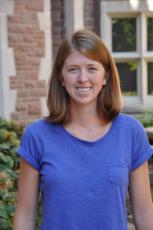Graduate Student Postdoc Spotlight with Kendra Smith from Psychological & Brain Sciences
The Graduate Student Postdoc Spotlight features interviews with graduate students and postdocs doing innovative teaching work at WashU. Look out for future installments of this monthly column on our website.
 “I try to make sure students feel like they belong and have an enjoyable experience learning,” said Kendra Smith, a graduate student in the Department of Psychological & Brain Sciences at Washington University in St. Louis. Kendra works in Richard Abrams’ Attention and Performance Laboratory at WashU, where she studies visual attention and perception.
“I try to make sure students feel like they belong and have an enjoyable experience learning,” said Kendra Smith, a graduate student in the Department of Psychological & Brain Sciences at Washington University in St. Louis. Kendra works in Richard Abrams’ Attention and Performance Laboratory at WashU, where she studies visual attention and perception.
Kendra also works as an instructor and an assistant to the instructor (AI) at the university. In Fall 2019, she taught an introductory course, “First-Year Opportunity: Contemporary Issues in Psychology.” She has also taught “Introduction to Psychology” and “Experimental Psychology” to undergraduate students. Kendra’s experience as an AI includes the courses “History and Modern System of Psychology” and “Cognitive Psychology.”
Kendra is an active participant in Center for Teaching and Learning programs including the Introduction to the Scholarship of Teaching and Learning (SoTL) seminar, which is designed to help graduate students and postdocs broaden their understanding of educational research. Kendra’s research project in the seminar focused on helping students in an introductory psychology course become critical consumers of science-based news.
Kendra has a B.S. in Psychology from Davidson College. She is pursuing a Ph.D. in Psychological & Brain Sciences.
In an interview with the Teaching Center, Kendra discussed how frequent interactions with a professor can bolster learning. She also emphasized how building students’ critical thinking and writing skills in a course can benefit them in future endeavors.
How did you become interested in psychological and brain sciences?
In undergrad, I had to take a social sciences class as part of a distribution requirement. I had already taken AP Psychology in high school, and there was a survey class available called Developmental Psychology, so I took it. I really liked it, even though it’s not the area I’m focused on now. Reading empirical articles for that class gave me a better view of what psychology was about. I decided to keep taking psychology classes. I took Cognitive Psychology my sophomore year and loved it, so I decided to major in psychology.
What does your research focus on?
I’m studying visual search, specifically the low prevalence effect. The low prevalence effect is our tendency to miss things we don’t see very often. This relates to routine baggage screenings and mammography. For example, TSA agents look through tons of bags and don’t see weapons very often. They’re notorious for not being able to find them when they’re planted in bags. In terms of mammography, the rate of cancer in routine mammography is less than one percent, so if you’re looking through hundreds of scans and you don’t see cancer very often, you’re less likely to find it when it’s there. I’m studying ways to reduce that error.
You spent some time teaching and tutoring Spanish. How did these experiences impact your teaching?
In undergrad, I was a volunteer Spanish teacher at an elementary school. I was also a teaching assistant for language classes. As I teaching assistant, I did language drills each week based on what the students were learning in class. That was a lot of fun because the TAs took turns making lessons, so I gained some experience with creating content. It was rewarding to get to know the students and see them improve over the semester.
What influenced you to pursue teaching?
I went to a liberal arts college in undergrad. I had really good experiences in the classroom and doing research. That influenced my desire to teach because having smaller classes and close contact with professors made me more interested in what I was learning.
What are your goals in the classroom?
I try to make sure students feel like they belong and have an enjoyable experience learning. Another big goal is to get students to understand the scientific process and build critical thinking skills that they can take elsewhere and will be useful in jobs, even if they aren’t related to psychology. I also focus on writing in my classes because that’s something else that students will take with them after they graduate.
You completed a SoTL project at WashU. Tell me about that process.
I took the Introduction to SoTL seminar the semester before I taught Introduction to Psychology as a summer course. I was thinking about what my main goals were for an intro course, and I decided one of them was students becoming critical consumers of research, especially in an era of “Fake News.” I took the course and developed a project that I was able to implement during a five-week summer course. It included a series of readings. We compared popular press articles with empirical articles. I had students answer questions, and I led class discussions about differences between the articles and fair conclusions you could draw from them.
Students improved a lot at identifying advantages and disadvantages of study designs over the course of the semester. Many studies are correlational designs, so you can’t make a causal claim, even though a lot of headlines do. Reading an evaluating the articles really helped students understand that. Students also became more confident in their ability to read and evaluate popular press articles.
I went to the CIRTL Forum to present my SoTL project. That was a great experience to meet other people interested in teaching and doing research on teaching. It showed me the importance of improving practices as you go along, and not just staying with the techniques you usually use. You should adapt your techniques to what students respond to.
What are some of the challenges of teaching, and how do you address them?
I taught Experimental Psychology this past summer. A lot of students aren’t thrilled to take that course. It’s one of the required ones, and many students majoring in psychology are interested in clinical work, but not research. Getting students to see the value of the course and the importance of research design can be difficult. In the course, students read literature, design an experiment, and write an APA-style manuscript. This is a challenging task and the first time many students have done something like this. Guiding them through the process and giving feedback can be challenging, but is very rewarding to see the students develop great ideas.
Considering class size differences is a challenge I hadn’t anticipated before teaching. I taught a Contemporary Issues in Psychology class where I had two students and another section in which I had 15 students. I had to think about ways to get students to engage with the material regardless of class size. You can’t do a debate with two students, but with 15 students, there’s a variety of activities you can do. It’s important to adapt your teaching style to the situation and students in the class.
How have Center for Teaching and Learning programs or events enriched your teaching?
I feel like I’ve learned a lot from the different workshops that I’ve taken. Psychology lies at the intersection of different fields, so I’ve taken STEM workshops with Dr. Julia Johnson and humanities, arts, and social sciences workshops with Dr. Meg Gregory. I’ve learned a lot from those and have come up with ideas about how to incorporate active learning in the classroom. I probably would have lectured more if I hadn’t learned about these teaching techniques because that’s how a lot of intro and survey classes are done. Learning about these techniques has positively impacted my teaching and gotten students more interested in the topics.
What advice do you have for graduate students who are teaching or considering teaching?
Try to get involved in the Center for Teaching and Learning to some extent. I think the workshops can really help you if you’re teaching or working as an AI.
Also, try to decide what you want to get out of the experience and communicate that to the instructor. There are assignments where you don’t have as much contact with students, but it’s valuable to pursue ones where you do. If students come to your office hours, you can learn a lot from that. You learn how to give feedback or how to help students who aren’t interested in the material or are struggling with it.
Take advantage of your opportunities as an AI. I think often, the professor you’re working with will be open to you becoming more involved in a course. If you ask to lecture, they’re often more than happy to have you do that. Be clear about what you want to get out of the experience and work with an instructor to reach those goals.
What are you future teaching aspirations, and how do you plan to achieve them?
I’m interested in teaching at a liberal arts college where I’d have a lot of student contact, both with small class sizes and providing students with beginning research opportunities. I’d like to have a small lab where students can gain skills that they might not otherwise learn until graduate school.
Another possibility I’d be interested in is working at a center for teaching and learning. I like the “teaching as research” aspect. Also, working with grad students to see how they could improve their teaching or discussing active learning strategies would be fun.
What was one of your most influential classes?
The Cognitive Psychology course in undergrad that solidified my desire to become a psychology major is one of my most memorable and formative classes. The professor worked to tell stories with the material instead of presenting a collection of facts. Seeing where things we know about cognitive psychology come from was interesting and made me want to do research myself.
Who are some of your favorite teachers, and why?
The professor of my undergraduate Cognitive Psychology course, Dr. Kristi Multhaup, was one of my favorite instructors. She was also my undergrad advisor. I’m a firstgeneration college student, and I had no idea what people did in grad school. Dr. Multhaup helped me understand what grad school is about and gave me research opportunities as an undergraduate. She also gave me good advice during the grad school application process.
I had a professor in undergrad who taught a statistics course, Dr. Scott Tonidandel. He taught us statistical programming. It was my first experience programming and I had no idea what I was doing. Even though it was probably more work for him, he took the extra step to teach us that, and it was really helpful in graduate school.

